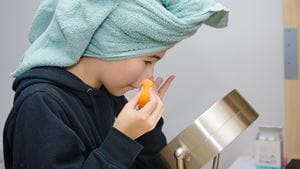
If you have gone inside an Ulta or Sephora store in the last year, it may seem like the average age of a customer is a bit younger than it used to be.
There is a good reason for that change. The worldwide skin care market, which generated $147 billion in 2021, is gaining popularity with younger groups. Skin care companies such as Bubble, Drunk Elephant, and Glow are creating specific products for beauty routines that are shared on TikTok or Reels videos by tweens and young teenagers.
But what does good skin care actually look like for kids and teenagers? Nananamibia Duffy, MD, is a board-certified dermatologist with Genesee Valley Dermatology & Laser Centre in Brighton and shares her experience on what kids should use for daily skin care – and what they should avoid.
Schedule A Consultation With A Dermatologist
Many young tweens and teenagers are learning about skin care through Get Ready With Me (GRWM) videos – a genre featuring videos with more than 180 billion views on TikTok alone. During GRWM videos, users are talking to the camera while going through a 3-5 step skin care routine. Some of these routines involve products with active ingredients that are intended for mature skin – such as anti-aging serums and peptides.
“These kids are getting information that’s not intended for them,” Dr. Duffy said. “But to stay on trend, they go out and get these things that they don’t need.”
Using products in skin care regimens containing active ingredients carries the risk of creating an irritant or contact dermatitis (irritating your skin by using a product) or creating an allergy with something that might need to be treated by a dermatologist.
Tweens and young teenagers should avoid using:
Retinol or other retinoid: Retinol or retinoids are best used as a way to manage acne or other skin conditions when prescribed or recommended by a dermatologist or pediatrician. It is not necessary for adolescents to use retinoids or retinol for the purpose of anti-aging.
Peptides: Peptides increase collagen production and smooth out wrinkles – two things that young people should not have to worry about.
Serums: No adolescents need to use an anti-aging serum. Using a product meant for a 50-year-old person with drier skin will achieve the opposite effect and clog their pores.
For kids ages 8-12 who are looking to start a healthy skin care routine, the routine should focus on three steps:
Choose a simple, gentle cleanser – ones that come in bar soaps, not liquid cleansers. Bar soaps have fewer chemicals than liquid soaps. There are several brands of simple bar cleansers, such as:
Avoid using bars that are intended for handwashing such as Dial or Irish Spring. Cleansing bar soaps should be intended for facial use.
Use a lotion or cream to allow moisture to absorb into the skin. For those who are more prone to acne, a lotion is better due to lower oil content. If dry skin and/or eczema is a concern, a cream is the better option because it is thicker and has more oil.
“It’s amazing how far using a gentle cleanser that isn’t stripping the natural oil from your skin and a good moisturizer can go – especially for people who are prone to eczema,” Dr. Duffy said.
Ideally, use a moisturizer that contains sunscreen (SPF 15-30). In New York, there is not as much sun as places like Florida, Colorado, or California. But especially in the spring and summer months, sun protection should be top of mind for everyone.
People whose skin burns easily should apply an actual sunscreen on top of their daily moisturizer.
The best thing anyone can do to keep their skin healthy – regardless of age – is to wear sunscreen.
A commonly-held myth is if a person gets a sunburn early in the summer, it serves as a basic level of sun protection for the rest of the summer. However, this exposure actually does more damage to the sun – making skin more wrinkled, less elastic, uneven, and splotchy.
It is best to be prepared if someone is going to be outside for more than a couple hours. Encourage adolescents to be responsible and carry their sunscreen to re-apply every 2 hours to protect their skin.
“We see so many patients who have signs of sun damage that happened earlier in their lives,” Dr. Duffy said. “Once you have sun damage, you cannot reverse it. You need to prevent it. Do your best to avoid ever getting a sunburn.”
